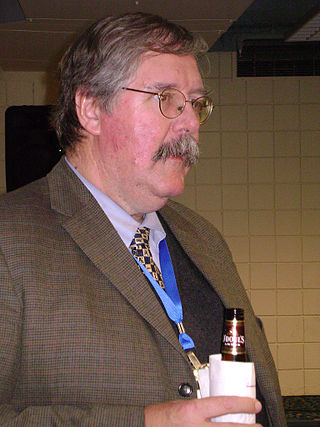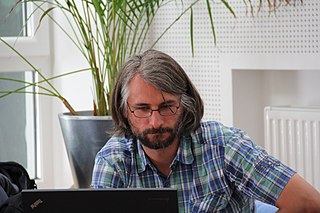Word-sense disambiguation (WSD) is the process of identifying which sense of a word is meant in a sentence or other segment of context. In human language processing and cognition, it is usually subconscious/automatic but can often come to conscious attention when ambiguity impairs clarity of communication, given the pervasive polysemy in natural language. In computational linguistics, it is an open problem that affects other computer-related writing, such as discourse, improving relevance of search engines, anaphora resolution, coherence, and inference.

SIL International is an evangelical Christian non-profit organization whose main purpose is to study, develop and document languages, especially those that are lesser-known, in order to expand linguistic knowledge, promote literacy, translate the Christian Bible into local languages, and aid minority language development.
MusicXML is an XML-based file format for representing Western musical notation. The format is open, fully documented, and can be freely used under the W3C Community Final Specification Agreement.
A friend-to-friend computer network is a type of peer-to-peer network in which users only make direct connections with people they know. Passwords or digital signatures can be used for authentication.

An electronic dictionary is a dictionary whose data exists in digital form and can be accessed through a number of different media. Electronic dictionaries can be found in several forms, including software installed on tablet or desktop computers, mobile apps, web applications, and as a built-in function of E-readers. They may be free or require payment.

Apertium is a free/open-source rule-based machine translation platform. It is free software and released under the terms of the GNU General Public License.

The XML Process Definition Language (XPDL) is a format standardized by the Workflow Management Coalition (WfMC) to interchange business process definitions between different workflow products, i.e. between different modeling tools and management suites. XPDL defines an XML schema for specifying the declarative part of workflow / business process.

Gramps is a free and open source genealogy software. Gramps is programmed in Python using PyGObject. It uses Graphviz to create relationship graphs.
Beryl T. "Sue" Atkins was a British lexicographer, specialising in computational lexicography, who pioneered the creation of bilingual dictionaries from corpus data.
Patrick Hanks is an English lexicographer, corpus linguist, and onomastician. He has edited dictionaries of general language, as well as dictionaries of personal names.

C. Michael Sperberg-McQueen is an American markup language specialist. He was co-editor of the Extensible Markup Language (XML) 1.0 spec (1998), and chair of the XML Schema working group.
Language resource management Lexical markup framework, is the International Organization for Standardization ISO/TC37 standard for natural language processing (NLP) and machine-readable dictionary (MRD) lexicons. The scope is standardization of principles and methods relating to language resources in the contexts of multilingual communication.

The National Centre for Research and Restoration in French Museums is the national research centre in France responsible for the documentation, conservation and restoration of the items held in the collections of more than 1,200 museums across France. C2RMF also carries out extensive scientific studies and data recording for these collections, and is active both nationally and internationally in the field of cultural heritage conservation and analysis. The C2RMF is involved in the development of technologies and scientific procedures employed in the preservation of art works and artefacts, both on its own and in partnership with other museums and research institutions across the globe.
Database preservation usually involves converting the information stored in a database to a form likely to be accessible in the long term as technology changes, without losing the initial characteristics of the data.
David Bradley is a linguist who specializes in the Tibeto-Burman languages of Southeast Asia. Born in the United States, Bradley was educated at the SOAS, University of London. He has spent most of his career in Australia and is currently professor emeritus at La Trobe University. Bradley has been an invited lecturer and keynote speaker many times and throughout the world, in particular the Himalayan Languages Symposium and the International Conference on Sino-Tibetan Languages and Linguistics.
Steven J DeRose is a computer scientist noted for his contributions to Computational Linguistics and to key standards related to document processing, mostly around ISO's Standard Generalized Markup Language (SGML) and W3C's Extensible Markup Language (XML).
Macmillan English Dictionary for Advanced Learners, also known as MEDAL, is an advanced learner's dictionary first published in 2002 by Macmillan Education. It shares most of the features of this type of dictionary: it provides definitions in simple language, using a controlled defining vocabulary; most words have example sentences to illustrate how they are typically used; and information is given about how words combine grammatically or in collocations. MEDAL also introduced a number of innovations. These include:

Sebastian Schaffert is a software engineer and researcher. He was born in Trostberg, Bavaria, Germany on March 18, 1976 and obtained his doctorate in 2004.
In markup languages and the digital humanities, overlap occurs when a document has two or more structures that interact in a non-hierarchical manner. A document with overlapping markup cannot be represented as a tree. This is also known as concurrent markup. Overlap happens, for instance, in poetry, where there may be a metrical structure of feet and lines; a linguistic structure of sentences and quotations; and a physical structure of volumes and pages and editorial annotations.
OntoLex is the short name of a vocabulary for lexical resources in the web of data (OntoLex-Lemon) and the short name of the W3C community group that created it.